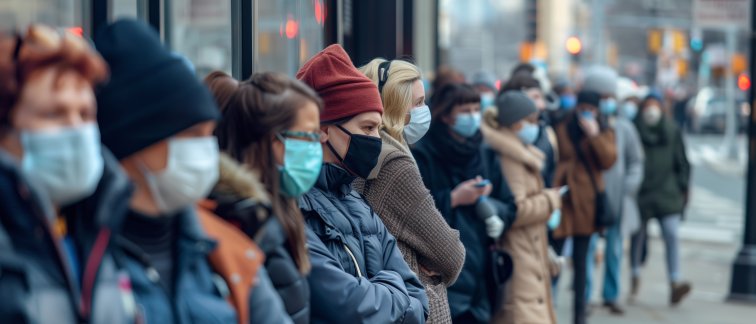Those who have experienced Covid-19, an infection caused by the notorious coronavirus, may have gained something positive from it. According to a study published in Science Translational Medicine, individuals are subsequently better protected against symptoms caused by other coronaviruses. The researchers identified the specific immune response responsible for this enhanced protection. The study also reveals new coronavirus proteins that could be added to existing vaccines to make them more effective and broadly applicable. Dr. Lia van der Hoek, virologist at Amsterdam UMC and a member of the Amsterdam Institute for Immunology and Infectious Diseases, shares her insights on the published research and findings from her own previous work.
What is popularly referred to as 'the' coronavirus is scientifically termed SARS-CoV-2 (Severe Acute Respiratory Syndrome-related coronavirus 2), and is part of a family of many more coronaviruses. This family includes dangerous relatives like SARS and MERS, which caused hundreds of deaths during outbreaks in 2003 and 2012, respectively. It also includes four milder 'siblings' known as seasonal coronaviruses, which generally cause only cold symptoms in healthy individuals but can make vulnerable people seriously ill. These coronaviruses account for between one-sixth and one-third of all common cold cases.
Less susceptible
Researchers have found that people who have had a SARS-CoV-2 infection are subsequently less susceptible to symptoms from seasonal coronaviruses. A coronavirus vaccination, which only targets the spike protein of SARS-CoV-2, does not provide this protection.
This finding prompted researchers to ask: what is the commonality between the body's immune response to SARS-CoV-2 and other coronaviruses?
Interestingly, the response is not based on antibodies (B cells)—the primary mechanism of our current coronavirus vaccines—but on T cells, another category of white blood cells. Specifically, CD8+ immune cells bind to two conserved proteins from the coronavirus interior: RNA replicase 12 (nsp12) and viral helicase 13 (nsp13). These proteins are almost identical among coronaviruses.
Thus, if you catch a cold from a seasonal coronavirus after a SARS-CoV-2 infection, your body already has a suitable immune response ready. Moreover, the body retains T cell immunity longer than antibody-based immunity. The researchers suggest that adding nsp12 and nsp13 to coronavirus vaccines could enhance future protection against coronaviruses, possibly even new variants.
Virologist Dr. Lia van der Hoek from Amsterdam UMC suggests that adding these specific antigens could indeed make coronavirus vaccines more effective. However, she also expects this form of immunity to be short-lived. In a study at Amsterdam UMC, with van der Hoek as one of the researchers, they observed the reverse: people who had a cold from another coronavirus variant (OC-43) just before a SARS-CoV-2 infection were better protected against Covid-19.
Elderly and Vulnerable
“We could not explain why that was the case at the time,” says Dr. van der Hoek. “It could indeed have been those CD8 cells. But if a year or more had passed between the two infections, people were no longer protected. If the current research has found a similar CD8 response, then the effect will be short-lived. However, for the elderly and vulnerable, who get a coronavirus booster and flu shot every year, this could still be beneficial.”
Dr. van der Hoek is doubtful whether adding the genetic codes of the two internal coronavirus proteins to the vaccine will protect us against future severe coronavirus variants: “We know the history. The world was significantly affected by SARS-CoV-2. If our immune response to seasonal coronaviruses were truly protective, the pandemic would not have been so severe. The fact is we only saw a significant difference after administering vaccines that generate antibodies against the virus's outer protein.” Therefore, protection based on neutralizing antibodies will remain an important component of a vaccine, according to Dr. van der Hoek.
This article is a revised version of an article originally published in Dutch on NRC.nl written by Karlijn Saris. Access the original piece here.
Learn more about our AI&I Covid-19 research:
Transfer of IgG from Long COVID patients induces symptomology in mice (July 2024)
Nucleocapsid Protein Accumulates in Epithelium of a Post-COVID-19 Patient (November 2023)
Preventive Measures Effective for Kidney Transplant Patients During COVID-19 Pandemic (September 2023)

